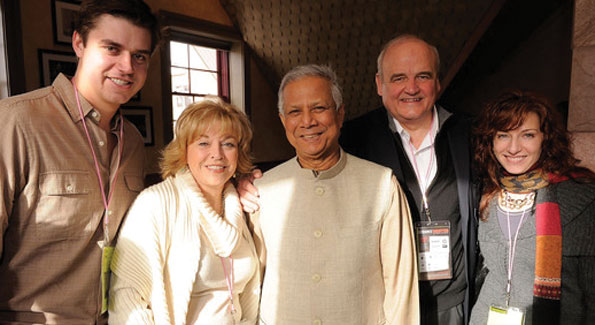Last year, Sundance Film Festival heavy-hitters scheduled around the inauguration, this time they stayed on to become the festival’s real A-list.
By Patricia Finneran
The 2010 Sundance experience was all about interesting juxtapositions of art and ideas, storytellers and change-makers. Jeff Skoll, who made his fortune with e-Bay, came with no less than four Participant films. Two won documentary audience-awards. One of them, Waiting for Superman, was from D.C. native Davis Guggenheim (whose last Participant partnership was An Inconvenient Truth). Guggenheim joked that when he discussed the idea of a film about public education in America with a friend in L.A., it sounded like career suicide. But it turns out the film’s primary subject, Geoffrey Canada, of Harlem Children’s Zone, is a superstar. His in-your-face belief in human potential at critical junctures has saved hundreds of lives. His vision for public education goes against conventional wisdom and teachers unions.
As if four weren’t enough, a fifth Skoll-supported film launched out of his Foundation’s “Stories of Change” partnership with Sundance Institute’s Documentary Film Program. Begun three years ago by the Institute’s Doc Program Director Cara Mertes and the Skoll Foundation, “Stories of Change” creates alliances between documentary filmmakers and social entrepreneurs, and provided co-production funding for ten feature-length documentaries. The project integrates the Foundation’s support of social change agents with the Doc Program’s belief that supporting independent storytellers can lead to change.
Nobel Peace prize winner Muhammad Yunus came to Park City for the premiere of that film, titled To Catch A Dollar: Muhammad Yunus Banks On America, from director Gayle Ferraro. The film interweaves Yunus’ story as founder of the Grameen bank and micro-credit movement in Bangladesh 30 years ago, with the launch of Grameen America (which will soon open a Washington branch.) Just as Wall Street was crashing, he was quietly shaking up notions about banking in the U.S., starting with a branch serving immigrant women in Queens, New York. It is a character-driven exploration of the current state of American financial system, where the working poor lack access to banks and recent college graduates struggle to escape the lure of easy credit cards and galloping interest rates.
The cluster of compelling issue-based films was reflected in a number of the most popular panels. Yunus, banker to the poor, appeared in one called “Can’t Be Done,” with Geoffrey Canada and Lester Brown, whom the Washington Post dubbed “one of the world’s most influential thinkers.” Brown advocates for radically simple solutions to climate change and has appeared in Michael Nash’s documentary Climate Refugees and his new book, “Plan B 4.0: Mobilizing to Save Civilization.” Moderator Sally Osberg, president of the Skoll Foundation, led a far-ranging discussion of solutions from these world leaders, that ended with a standing ovation from an audience hungry for change.
Later that week, along with journalist Amy Goodman and Academy Award nominee Laura Poitras, the “Saving Democracy” panel featured veteran filmmaker Alex Gibney, whose mix of money and politics in Casino Jack: The United States of Money is a stunning expose of the ex-king of K Street. If you thought you knew the story … This expertly researched film lays out the scandalous details with stunning clarity, forming a grim reminder that without campaign finance reform, democracy remains for sale.
Also for sale, according to Lucy Walker’s documentary Countdown to Zero, (one of the four Participant films) are a wide variety of nuclear weapons and materials in a ticking time-bomb of a global marketplace. CTZ features a who’s who of international security (Gorbachev, Brzezinski, Musharraf, etc.), including former Washingtonian Valerie Plame Wilson, a leading nuclear proliferation expert and so-called “reluctant celebrity” who nonetheless attended the film’s premiere.
If it all sounds like doom and gloom, it isn’t. When teachers and authors are feted like stars, and when Hollywood actors pose with Nobel Prize winners, there’s reason to celebrate. As Sundance Institute Founder Robert Redford has said, “Storytelling itself is an act of hope.” Each and every film featured at the 2010 festival stayed true to that vision by representing a filmmaker’s hope: realizing a vision, altering a perception, bringing clarity to complexity, or, just telling a singular story of change.





